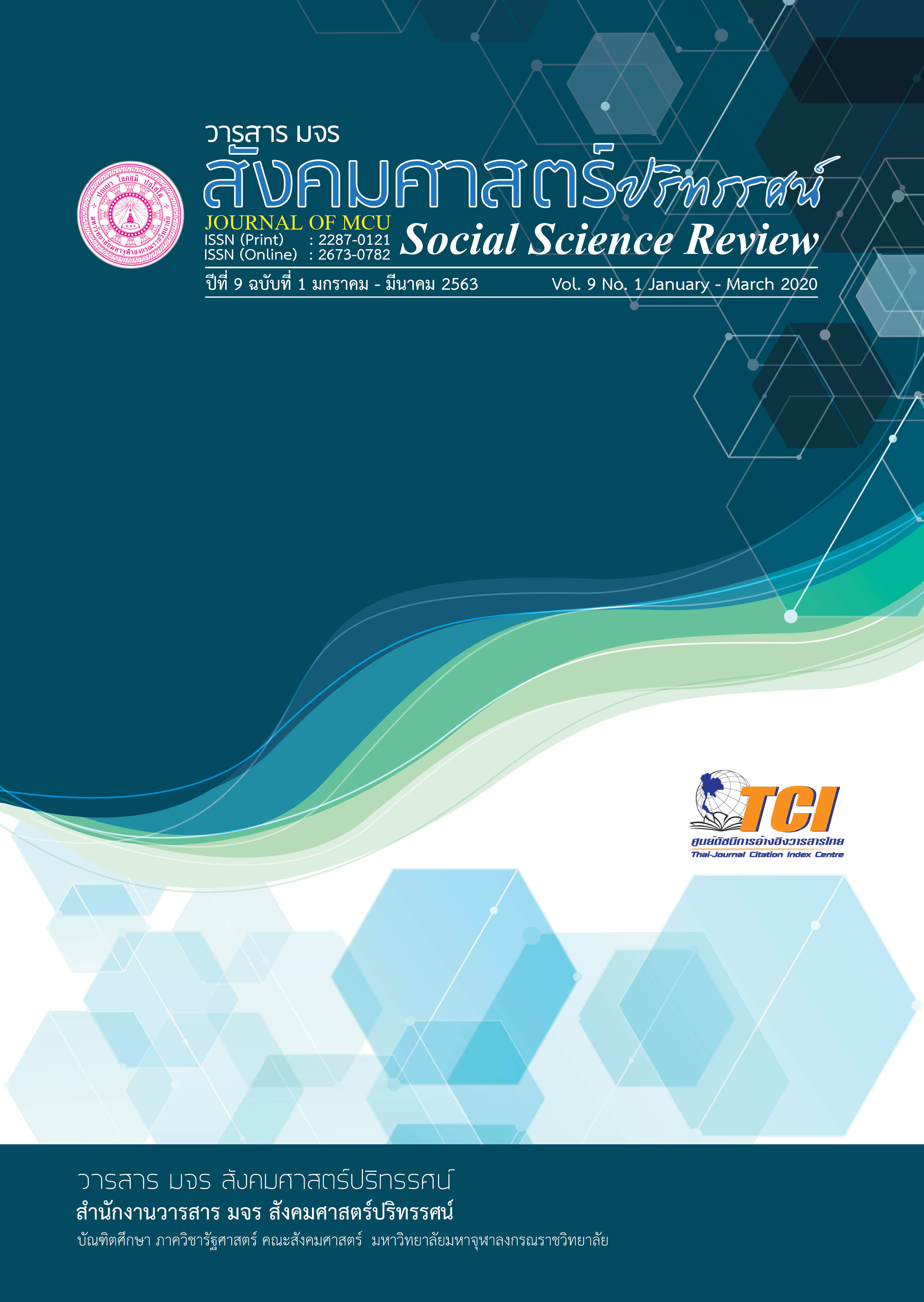การขับเคลื่อนแผนยุทธศาสตร์การปฏิรูปกิจการพระพุทธศาสนา ด้านการปกครองของคณะสงฆ์จังหวัดสระบุรี
คำสำคัญ:
การขับเคลื่อนแผนยุทธศาสตร์, การปฏิรูปกิจการพระพุทธศาสนา, การปกครองของคณะสงฆ์บทคัดย่อ
บทความวิจัยนี้มีวัตถุประสงค์เพื่อศึกษาสภาพทั่วไปองค์ประกอบในการขับเคลื่อนแผนยุทธศาสตร์และนำเสนอการขับเคลื่อนแผนยุทธศาสตร์การปฏิรูปกิจการพระพุทธศาสนา โดยใช้ระเบียบวิธีวิจัยแบบผสานวิธี โดยการสัมภาษณ์เชิงลึกกับผู้ให้ข้อมูลสำคัญ 22 รูป/คน และการสนทนากลุ่มเฉพาะผู้ทรงคุณวุฒิ 11 รูป/คน วิเคราะห์ข้อมูลแบบพรรณนาความ และเก็บข้อมูลเชิงปริมาณ โดยแบบสอบถามกับกลุ่มตัวอย่าง 262 รูป สถิติที่ใช้ คือ ค่าความถี่ ค่าร้อยละ ค่าเฉลี่ยและส่วนเบี่ยงเบนมาตรฐานผลการวิจัยพบว่า 1. พระสังฆาธิการมีความมุ่งมั่นในการปฏิบัติงานของคณะสงฆ์ให้บรรลุเป้าหมาย เข้าใจในองค์กรของตนเองเป็นอย่างดี หมั่นพัฒนาตนเองให้มีความรู้ความสามารถในการบริหารกิจการคณะสงฆ์คณะสงฆ์ 2. องค์ประกอบในการขับเคลื่อนต้องมีความเข้าใจในองค์กรของตนเองเป็นอย่างดี กำหนดแผนยุทธศาสตร์ที่มีประสิทธิภาพประสิทธิผลได้ รวมกลุ่มกันจัดตั้งทีมงานเพื่อทำกิจกรรมในการขับเคลื่อนแผนยุทธศาสตร์ร่วมกับรัฐบาล และประชาชน 3. การขับเคลื่อนแผนยุทธศาสตร์ ได้แก่ 1) สร้างความมั่นคงด้านพระพุทธศาสนา 2) ยกระดับกระบวนการบริหารจัดการภายใน 3) พัฒนาสู่องค์กรแห่งการเรียนรู้เชิงพุทธ และ 4) มีทรัพยากรเพียงพอในการขับเคลื่อนกิจการพระพุทธศาสนา
เอกสารอ้างอิง
เกียรติศักดิ์ สุขเหลือง. (2561). กลยุทธ์การบริหารองค์กรสงฆ์ที่เข้มแข็งในยุคโลกาภิวัฒน์. วารสาร มจร สังคมศาสตร์ปริทรรศน์, 7(1) 99-115.
คณะสงฆ์จังหวัดสระบุรี. (2561). แผนยุทธศาสตร์การปฏิรูปกิจการพระพุทธศาสนา จังหวัดสระบุรี (พ.ศ. 2561-2564). สระบุรี: คณะสงฆ์จังหวัดสระบุรี.
พระครูปลัดอาทิตย์ อตฺถเวที (ซองดี). (2547). การศึกษาแนวความคิดและวิธีการปกครองคณะ สงฆ์ของพระเทพโสภณ(ประยูร ธมฺมจิตฺโต): ศึกษาเฉพาะกรณีพระสังฆาธิการเขตปกครองภาค 2 (วิทยานิพนธ์พุทธศาสตรมหาบัณฑิต). พระนครศรีอยุธยา: มหาวิทยาลัยมหาจุฬาลงกรณราชวิทยาลัย.
พระครูวิสุทธิสีลาภิวัฒน์. (2562). การขับเคลื่อนแผนยุทธศาสตร์การปฏิรูปกิจการพระพุทธศาสนาด้านการปกครองของคณะสงฆ์จังหวัดสระบุรี (ดุษฎีนิพนธ์ปริญญาพุทธศาสตรดุษฎีบัณฑิต สาขาวิชาการจัดการเชิงพุทธ). พระนครศรีอยุธยา: มหาวิทยาลัยมหาจุฬาลงกรณราชวิทยาลัย.
พระธรรมปริยัติโสภณ (วรวิทย์ คงฺคปญฺโ). (2548). การคณะสงฆ์และการพระศาสนา (พิมพ์ครั้งที่ 3). กรุงเทพฯ: โรงพิมพ์มหาจุฬาลงกรณราชวิทยาลัย.
พระมหากฤษฎา กิตฺติโสภโณ. (2562). ภาวะผู้นำในการปกครองคณะสงฆ์ของพระสังฆาธิการ อำเภอ บางบาลจังหวัด พระนครศรีอยุธยา. วารสาร มจร สังคมศาสตร์ปริทรรศน์, 8(1), 84-95.
พระมหาอชิรวิชญานันท์ อริยเมธิโก (ทิพย์มณี). (2552). บทบาทของพระราชธรรมโสภณในการ ปกครองคณะสงฆ์จังหวัดร้อยเอ็ด (วิทยานิพนธ์ศาสนศาสตรดุษฎีบัณฑิต สาขาวิชารัฐศาสตร์การปกครอง). นครปฐม: มหาวิทยาลัยมหามกุฎราชวิทยาลัย.
รุจิรา สง่าแสงและประณต นันทิยะกุล. (2560). การบริหารจัดการเพื่อส่งเสริมการปกครองคณะสงฆ์ภาค 15 ตามแนวคิดการบริหารจัดการคณะสงฆ์วารสารวิชาการมหาวิทยาลัยอิสเทิร์นเอเชีย ฉบับสังคมศาสตร์และมนุษยศาสตร์, 7(1), 100-112.
Yamane, T. (1973). Statistics: An Introductory Analysis. New York: Haper and Row Publication.
ดาวน์โหลด
เผยแพร่แล้ว
รูปแบบการอ้างอิง
ฉบับ
ประเภทบทความ
สัญญาอนุญาต
ลิขสิทธิ์ (c) 2020 วารสาร มจร สังคมศาสตร์ปริทรรศน์

อนุญาตภายใต้เงื่อนไข Creative Commons Attribution-NonCommercial-NoDerivatives 4.0 International License.
เพื่อให้เป็นไปตามกฎหมายลิขสิทธิ์ ผู้นิพนธ์ทุกท่านต้องลงลายมือชื่อในแบบฟอร์มใบมอบลิขสิทธิ์บทความให้แก่วารสารฯ พร้อมกับบทความต้นฉบับที่ได้แก้ไขครั้งสุดท้าย นอกจากนี้ ผู้นิพนธ์ทุกท่านต้องยืนยันว่าบทความต้นฉบับที่ส่งมาตีพิมพ์นั้น ได้ส่งมาตีพิมพ์เฉพาะในวารสาร มจร สังคมศาสตร์ปริทรรศน์ เพียงแห่งเดียวเท่านั้น หากมีการใช้ภาพหรือตารางหรือเนื้อหาอื่นๆ ของผู้นิพนธ์อื่นที่ปรากฏในสิ่งตีพิมพ์อื่นมาแล้ว ผู้นิพนธ์ต้องขออนุญาตเจ้าของลิขสิทธิ์ก่อน พร้อมทั้งแสดงหนังสือที่ได้รับการยินยอมต่อบรรณาธิการ ก่อนที่บทความจะได้รับการตีพิมพ์ หากไม่เป็นไปตามข้อกำหนดเบื้องต้น ทางวารสารจะถอดบทความของท่านออกโดยไม่มีข้อยกเว้นใดๆ ทั้งสิ้น





